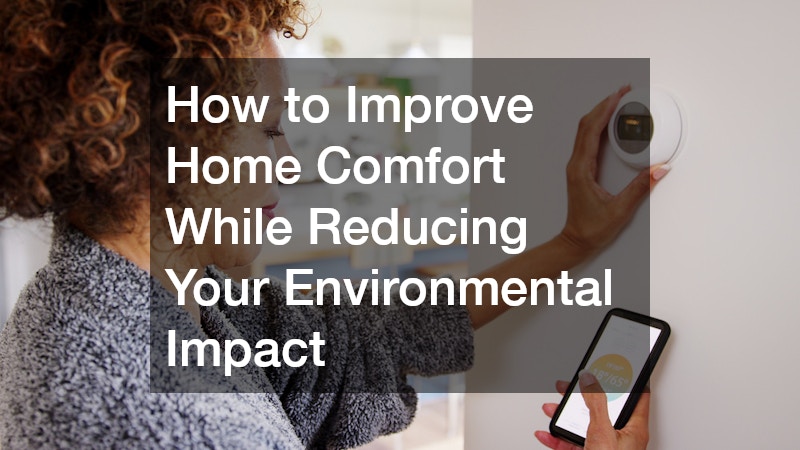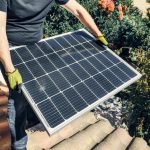Creating a comfortable and sustainable home requires more than simply upgrading a few appliances or replacing worn materials. Eco-conscious homeowners are increasingly seeking ways to reduce their environmental footprint while enhancing the livability of their homes. By carefully considering energy efficiency, indoor air quality, and overall system performance, families can enjoy improved comfort without sacrificing sustainability. Thoughtful home improvements also often translate to long-term savings on utility bills and maintenance costs, providing both environmental and financial benefits. Understanding the interplay between structural improvements, mechanical systems, and regular maintenance is key to achieving a balanced and eco-friendly living environment that stands the test of time.
Sustainability in the home is not just about installing solar panels or energy-efficient windows. It also involves evaluating how existing systems operate, identifying areas of energy loss, and implementing solutions that reduce waste and enhance comfort. From temperature regulation and water management to insulation and ventilation, every component of a home can contribute to energy efficiency when approached intentionally. Homeowners who take a holistic view of their living space are better equipped to prioritize projects that deliver meaningful results for both their comfort and the planet. Thoughtful planning ensures improvements are practical, cost-effective, and impactful, benefiting both current residents and future occupants.
Upgrading Home Water Systems for Efficiency
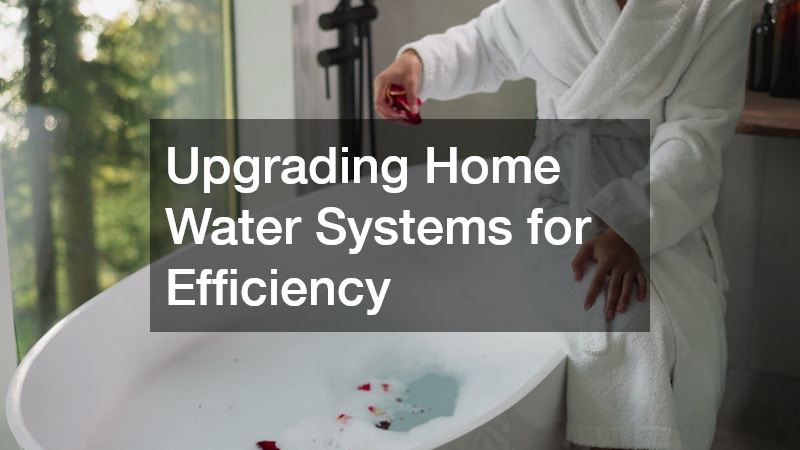
Water heating accounts for a significant portion of a home’s energy consumption, making it a prime target for eco-conscious improvements. Traditional storage water heaters can waste energy by constantly maintaining a large tank of hot water, even when it isn’t needed. In contrast, modern water systems are designed to provide heat on demand, ensuring efficiency and reducing unnecessary energy use. By optimizing how water is heated, homeowners can enjoy a consistent supply while minimizing environmental impact. The design of a home’s water system also influences long-term comfort, as proper temperature control supports both daily routines and overall energy efficiency in a more sustainable way.
For homeowners looking to implement a more sustainable solution, a tankless water heater can dramatically reduce energy waste. Unlike conventional units, this system heats water only when it is needed, eliminating standby losses and offering virtually endless hot water. Installing a tankless system can also free up space in utility areas, streamline maintenance, and contribute to a lower carbon footprint. Additionally, pairing this upgrade with low-flow fixtures and smart temperature controls can further enhance energy savings and ensure a more efficient and eco-friendly home water system that supports long-term sustainability goals.
Maintaining Clear and Healthy Drainage
Effective drainage is essential for both home comfort and environmental protection. Clogged or poorly maintained drains can cause water damage, unpleasant odors, and inefficient water usage. By prioritizing regular maintenance, homeowners can preserve the functionality of their plumbing systems while reducing the risk of costly repairs. Ensuring proper drainage also supports a healthy indoor environment, preventing mold growth and other moisture-related issues that can compromise comfort and sustainability. A well-planned drainage system safeguards structural components while promoting an eco-conscious lifestyle.
In practical terms, using eco-friendly drain cleaners can be an integral part of maintaining clear drainage. These products are formulated to remove buildup without introducing harsh chemicals that can harm the environment or disrupt local water systems. Regular, mindful use of safe drain cleaners helps prevent blockages and keeps wastewater flowing smoothly. Combining these cleaners with periodic mechanical inspections or minor plumbing adjustments ensures the home’s drainage system operates efficiently and sustainably over time, providing consistent performance that homeowners can rely on.
Relying on Professionals for Plumbing Maintenance
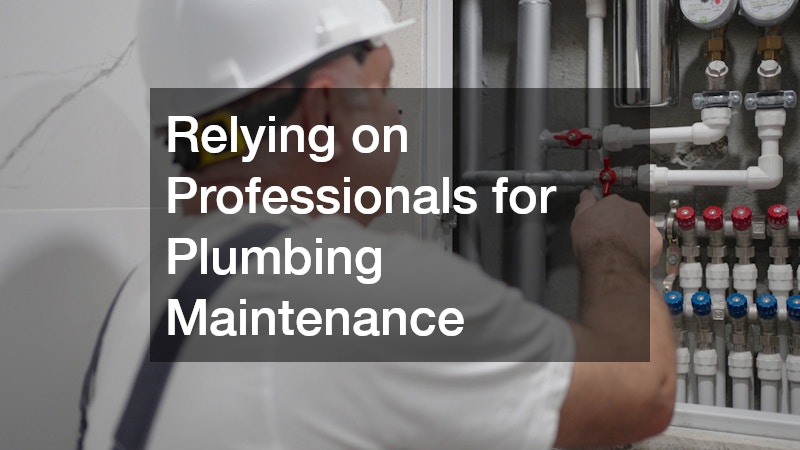
Even the most conscientious homeowners benefit from professional guidance when it comes to plumbing. Plumbing systems are intricate and require specialized knowledge to maintain and repair effectively. Relying on skilled professionals ensures that issues are identified early, preventing larger problems that could compromise comfort or efficiency. Homeowners who prioritize expert service can extend the lifespan of their plumbing infrastructure while minimizing unnecessary water and energy waste. Reliable professionals provide expertise, efficiency, and advice tailored to each home’s unique layout and condition.
Engaging a local plumbing service provides the advantage of experienced technicians familiar with regional water conditions, building codes, and sustainable practices. These professionals can assess system performance, recommend energy-saving upgrades, and address maintenance needs with precision. By scheduling regular inspections and collaborating with experts, homeowners can maintain reliable water delivery, prevent leaks, and ensure that their plumbing systems support a more comfortable and environmentally responsible home. The local expertise also helps identify eco-friendly solutions that align with community regulations and long-term sustainability goals.
Enhancing Home Comfort Through Subfloor Insulation
Insulation plays a vital role in regulating indoor temperature and reducing energy consumption. Airflow from poorly insulated areas, particularly in subfloor spaces, can lead to drafts, uneven heating, and unnecessary strain on heating and cooling systems. By focusing on insulation strategies that address these vulnerabilities, homeowners can significantly improve comfort while reducing energy usage. The quality and placement of insulation are critical, as gaps or improperly installed materials can negate the benefits of otherwise efficient systems and compromise sustainability objectives.
Crawlspace insulation, specifically, helps maintain consistent indoor temperatures by limiting heat transfer between the home and the ground below. Proper installation reduces moisture buildup, which can otherwise lead to mold, wood rot, and other structural concerns. Choosing environmentally friendly insulation materials further enhances the home’s sustainability profile. By addressing crawlspace insulation strategically, homeowners achieve a more comfortable living environment while actively supporting energy conservation and long-term durability, ensuring that both comfort and eco-conscious goals are met simultaneously.
Working with Experts to Improve Energy Efficiency

Home insulation is a complex field that encompasses walls, attics, basements, and more. While DIY projects can handle minor improvements, consulting a qualified insulation contractor ensures that upgrades are performed correctly and safely. Professionals can evaluate thermal performance, identify areas of inefficiency, and recommend appropriate materials that balance comfort and environmental responsibility. Proper insulation not only regulates temperature but also reduces the energy demand placed on heating and cooling systems, resulting in both cost savings and a lower carbon footprint while enhancing overall home comfort.
An insulation contractor can provide tailored solutions that align with a home’s unique layout and climate considerations. From air sealing to high-performance insulating materials, these experts enhance the home’s ability to retain heat during the winter and remain cool in the summer. In addition, they can integrate eco-friendly products that minimize environmental impact while maximizing performance. By collaborating with a contractor, homeowners can achieve measurable improvements in energy efficiency, long-term comfort, and sustainability simultaneously, ensuring investments deliver meaningful and lasting benefits.
Optimizing Climate Control Systems
Modern climate control systems are increasingly designed to offer precise temperature regulation while minimizing energy consumption. Variable refrigerant flow (VRF) systems, for example, allow different zones of a home to be heated or cooled independently, reducing wasted energy and improving comfort. Homeowners who understand the potential of advanced systems can make more informed choices that enhance both livability and sustainability. Proper system design also influences indoor air quality, ensuring that the home environment remains comfortable throughout the year and contributes to overall energy efficiency.
A VRF system is particularly beneficial for eco-conscious households because it adapts output based on demand. This means that energy is delivered only where and when it is needed, reducing overall consumption. Combined with smart controls, regular maintenance, and appropriate insulation, these systems contribute to a balanced indoor climate while supporting energy conservation goals. Properly installed and managed, a VRF system is an investment in both comfort and environmental responsibility that pays dividends in reduced energy costs and improved home performance.
Ensuring Reliable Heating Throughout the Year
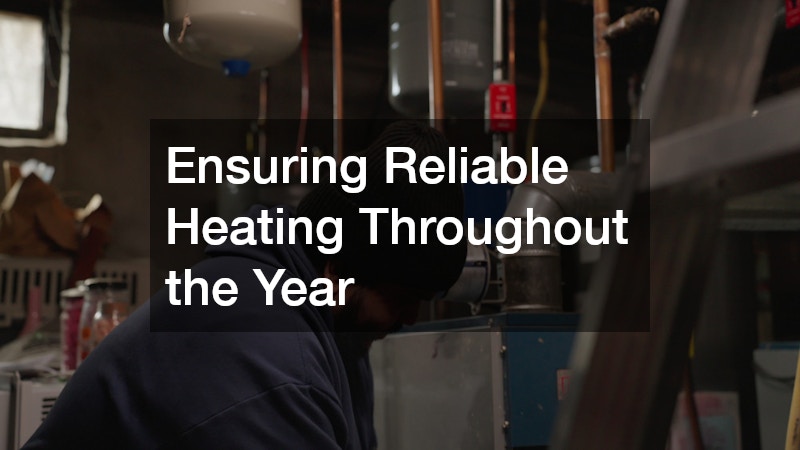
Heating systems are essential to home comfort, particularly in regions with cold winters. A malfunctioning or inefficient furnace can lead to uneven temperatures, higher energy bills, and increased environmental impact. Regular assessment and timely repairs help maintain system efficiency, extend equipment lifespan, and ensure that indoor spaces remain comfortable year-round. Understanding how heating systems operate also empowers homeowners to identify early signs of wear or malfunction before minor issues escalate into expensive and disruptive problems.
Furnace repairs, when performed promptly by qualified professionals, restore reliable performance and optimize energy efficiency. Addressing components such as burners, filters, and ductwork ensures that the system delivers consistent heat while reducing unnecessary fuel consumption. Routine maintenance and timely repairs not only enhance comfort but also minimize greenhouse gas emissions associated with inefficient heating systems, aligning home performance with eco-friendly principles. These efforts ultimately provide a more resilient and efficient home environment that benefits residents and the planet.
Keeping Septic Systems Functional and Eco-Friendly
Proper management of septic systems is a critical, though often overlooked, aspect of sustainable homeownership. A well-maintained septic system prevents contamination of groundwater, reduces unpleasant odors, and supports efficient wastewater treatment. Neglecting regular maintenance can lead to costly repairs, environmental hazards, and compromised comfort. Homeowners seeking to reduce their environmental impact should prioritize ongoing care and monitoring of these systems to maintain both functionality and ecological balance.
Septic pumping service plays a key role in maintaining system health by removing accumulated solids that can impede function. Regular pumping prevents backups, preserves soil absorption efficiency, and ensures that wastewater is managed safely. By scheduling consistent service intervals and monitoring system performance, homeowners protect both their property and the surrounding environment, fostering a healthier, more sustainable home ecosystem. Consistent attention to these services supports long-term septic reliability and reduces potential environmental risks.
Choosing Effective Septic Maintenance Solutions
In addition to routine pumping, maintaining a septic system requires attention to the quality and safety of cleaning products used. Eco-conscious homeowners benefit from selecting septic cleaners designed to support microbial activity rather than disrupt it. These products help break down organic waste while reducing chemical exposure, ensuring that the system continues to operate effectively and safely. Thoughtful maintenance practices contribute to both long-term functionality and environmental protection, reinforcing responsible ownership.
Septic cleaners formulated for sustainability offer a practical solution to everyday maintenance needs. They help prevent clogs, maintain optimal flow, and reduce odor without introducing harmful substances into the soil or groundwater. When used in conjunction with regular inspections and professional service, these cleaners support the overall efficiency and longevity of the septic system. Homeowners can achieve peace of mind knowing that their septic maintenance aligns with both comfort and environmental goals while minimizing ecological impact.
Managing Comprehensive Septic Care for Sustainability
A holistic approach to septic management ensures that systems function efficiently and sustainably over the long term. Comprehensive septic services encompass routine inspections, pumping, and targeted maintenance to prevent failures and extend system lifespan. By adopting a proactive approach, homeowners reduce environmental risks and avoid costly emergency repairs while maintaining a comfortable living environment. Such strategies also encourage responsible water usage and waste management practices throughout the household.
Engaging in full-scale septic services allows for early detection of potential issues such as leaks, blockages, or system imbalances. Professionals provide tailored solutions that maintain optimal system function while adhering to eco-friendly practices. Regularly scheduled services, combined with responsible use and monitoring, create a resilient wastewater system that aligns with both comfort and sustainability priorities, reinforcing the home’s overall environmental performance. This proactive approach ensures both peace of mind and long-term ecological responsibility.
Improving home comfort while reducing environmental impact requires thoughtful planning, strategic upgrades, and ongoing maintenance. From water systems and drainage to insulation, heating, and septic care, every component of a home can influence energy consumption, indoor air quality, and overall livability. Eco-conscious homeowners who approach home improvements holistically are better equipped to prioritize investments that deliver measurable benefits for both comfort and sustainability. Thoughtful design and maintenance decisions also reduce environmental risks, ensuring that homes remain safe, efficient, and enjoyable over time.
By understanding the interconnected nature of mechanical systems, insulation, and water management, families can make informed decisions that minimize waste, improve energy efficiency, and enhance daily living conditions. Regular maintenance, expert guidance, and the careful selection of sustainable solutions ensure that improvements last, creating a home that is both comfortable and environmentally responsible. Thoughtful upgrades and diligent care empower homeowners to create living spaces that reflect their commitment to sustainability while promoting long-term comfort and efficiency. In this way, sustainable home improvement becomes a long-lasting investment in quality, health, and environmental stewardship.
